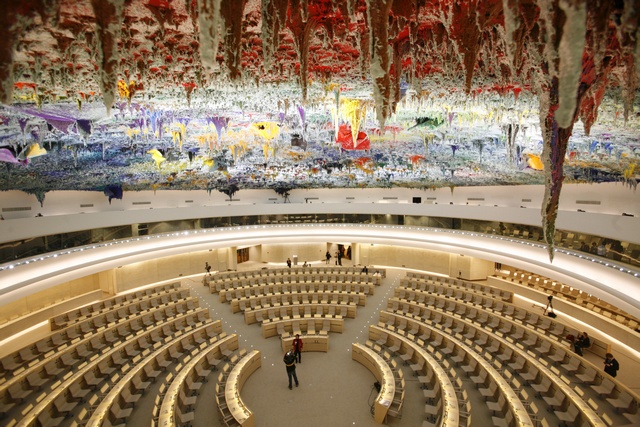Human Rights Council – Session 11
Oral Intervention – Agenda Item 4: General Debate
Cairo Institute for Human Rights Studies (CIHRS)
Delivered by Dina Mansour
Thank you Mr. President
The Cairo Institute for Human Rights Studies would like to draw the attention of this Council to the systematic and widespread repression and persecution of ethnic and religious minority groups throughout the Arab region. Almost all Arab governments have long been and are still unwilling to take tangible steps towards the realization of an integration of the different cultural, ethnic and religious minorities in their countries. Suffering from repressive and discriminatory policies as well as practices, minority groups are often excluded and denied the most basic of their human rights.
Sectarian, ethnic and religious minorities in most Arab countries, including Egypt, Sudan, Saudi Arabia, Yemen, Syria, and Iraq continue to be subjected to ethnic and religion-based discrimination. Throughout many parts of the region, especially within Saudi Arabia and Bahrain, Shiites are denied access to senior positions in the government and government-owned institutions and are regularly marginalized in the economic, educational and political realms. The Kurds in Syria are still subject to unfair trials and legal regimes of discrimination based on their ethnic identity. In Egypt, restriction of religious freedoms is not only limited to believers in unrecognized religions or creeds, but also extends to different groups of individuals who hold a different interpretation from; the State’s official Sunni interpretation. In many Arab countries, converting or reconverting to Christianity continues to be seen as an act of “apostasy,” an offense that is punishable by death in Sudan and Saudi Arabia and are denied to have their new faith recognized in official documents in Egypt.
CIHRS applauds the decision by the Egyptian Supreme Administrative Court on March 16, 2009, to allow those of the Baha’i faith to obtain identity documents by leaving the religious classification field on official documents blank. This positive first step needs to be followed up by concrete implementation of the ruling over the coming period to ensure it’s swift and smooth enforcement for all Baha’is as well as converts and reconverts from Islam. Egypt should also ensure equitable investigations and accountability for violent attacks on different religious communities and sects which continue to occur with impunity in Egypt.
While discrimination and hostility against religious and ethnic minorities in all regions of the world is on the rise, CIHRS would like to highlight that the discriminatory policies and the culture of impunity for human rights violations against religious and ethnic minorities or, as in the case of Bahrain, non-state sanctioned religions, among Arab governments has resulted in widespread instability throughout the region. In Iraq, Sudan and Yemen civil wars and insurgencies that have the claimed the lives of thousands of civilians have largely been caused by state repression and violent persecution of ethic and religious minorities.
Thank you Mr. President.
Share this Post

